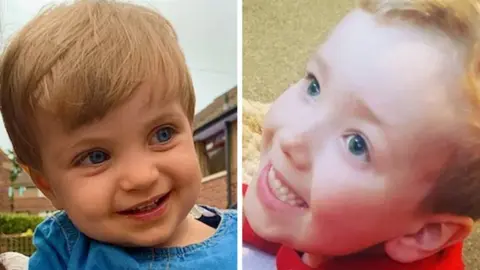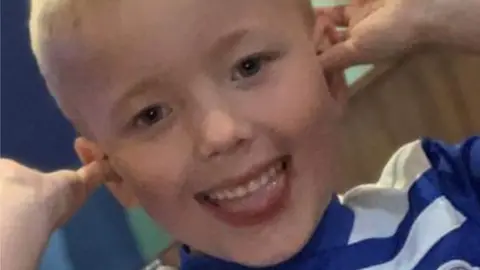Star Hobson and Arthur Labinjo-Hughes: Family concerns disregarded - report
 Family photos
Family photosFamily concerns for Star Hobson and Arthur Labinjo-Hughes were too often "disregarded and not taken sufficiently seriously", says a report on how professionals failed to protect them.
Arthur, aged 6 from Solihull, and Star, 16 months from Bradford, were murdered by their parents' partners in 2020.
Both "suffered horrific and ultimately fatal abuse", said Annie Hudson, who chaired the review.
Their deaths reflect "fault lines" in child protection in England, she added.
Arthur and Star's stories are not isolated incidents, the Child Safeguarding Practice Review Panel said.
The "wider problems" the report highlights include poor information sharing between professionals and weak decision making.
The report urges the government to strengthen the child protection system at a national and local level.
Its publication follows Monday's "once-in-a-generation" Independent Review of Children's Social Care which called for a total reset of council-run children's services across England.
 David Fawcett
David Fawcett"At the moment, each professional who comes into contact with a child holds one piece of the jigsaw of what is happening in a child's life," said Ms Hudson.
"Our proposed reforms would bring together experts from social work, police and health into one team so that they can have a better picture of what is happening to a child, listening carefully to relatives' concerns and taking necessary actions to protect children."
As part of the review, the panel interviewed just under 80 professionals in Bradford, Birmingham and Solihull as well as the children's family members, including Star's mother and her mother's partner.
The current system is not "broken", Ms Hudson said in the report: "Every day, many thousands of children are protected from harm by conscientious, committed and capable social workers, police officers, health, educational and many other professionals."
However, these multi-agency arrangements "are not yet fit for purpose everywhere" and, as a consequence, hundreds of children are seriously harmed, she added.

What did the review say about Arthur and Star?
The review highlighted specific failings in each of the two cases.
Arthur was murdered in June 2020 by his stepmother Emma Tustin at their home in Solihull, West Midlands. His father Thomas Hughes, 29, was found guilty of his son's manslaughter.
The report found concerns about bruising, raised by family members, were not always taken seriously and his voice was not always heard.
Too many assessments relied on the perspective of his father, now in jail for manslaughter, it added.
 West Midlands Police
West Midlands PoliceStar was murdered by her mother's girlfriend at her home in West Yorkshire, in September 2020. Star's mother Frankie Smith, 20, was found guilty of causing or allowing the youngster's death.
The report said concern from a family member was explained away as being malicious and rooted in a dislike of her mother's same-sex relationship - and this view was "too easily accepted", says the review.
It added that Bradford children's social care was "in turmoil" in 2020 and this contributed to "superficial" assessments that failed to address the concerns of Star's wider family.
Star's great-grandfather, David Fawcett, said the report was "a lot to take in" but the family were "just hoping something will come out of this... We don't want things happening to other children like what happened to Star."
"If social services had done their job in their first place, I think Star... would still be with us," he said.
Alicia Szepler, Star's aunt, added: "If they'd [the authorities] have all just listened to each other and worked together then they might have actually found the truth of what was happening, the bigger picture."


The report found child protection work is inherently complex, but the current system does not give professionals the best opportunity "to get to the truth of what life is like for children".
It also identifies a reliance on quickly pulling together a team from overstretched agencies every time there is a child protection concern, which is "certainly inefficient and often ineffective".
Its recommendations include:
- Dedicated child protection teams of police, healthcare staff and social workers to investigate allegations of serious harm to children in every council area
- A national child protection board to co-ordinate policy
- Ensuring all child protection assessments include input from all relevant professionals, family members and other significant adults
 Family handout
Family handoutThe review was commissioned in December 2021 by Education Secretary Nadhim Zahawi. He thanked Star and Arthur's families for their contributions to the report and promised "a bold implementation plan later this year".
"We must waste no time learning from the findings of this review - enough is enough," he added.


Part of the tragedy that lies behind the deaths of Star and Arthur is that many of the failings outlined in this report have been highlighted before in other horrific cases that have made headlines.
Reports into the murder of Victoria Climbie and the death of Peter Connelly - Baby P - also pointed to manipulative parents or carers not being challenged enough, wider families not being listened to, poor information-sharing and weak decision-making.
It is important to say that responsibility for what happened to all these children lies with the people who abused them. We will also never hear of the many, many children who are protected from harm.
Today's report recommends new teams that will bring concentrated expertise into child protection investigations, but for this to work other system-wide problems that are highlighted will need to be tackled. This includes the high turnover of social workers, many burnt-out by the pressures of child protection.
Wide-ranging plans for the reform of children's social care have also been published this week.
They aim to shift the focus from crisis intervention to early help for families. And whilst the distressing deaths of children like Star and Arthur may focus our minds on the problems of protecting children right now, past experience suggests it will take long-term investment and commitment at a national level to make sure change really happens.

Theresa Patten, chief executive of Bradford District Care Foundation Trust, said: "We're so deeply sorry for what happened."
She added: "There were things that were missed in the story of Star's life and death and we have to use those to build our commitment to absolutely not let this sort of thing happen again."
Solihull Council has not commented on the report yet.
NSPCC chief executive Sir Peter Wanless said Arthur and Star's deaths "have left a lasting scar on the nation".
"Now, we must ensure the memory of Arthur and Star acts as a catalyst for the fundamental changes necessary to prevent further deaths."
